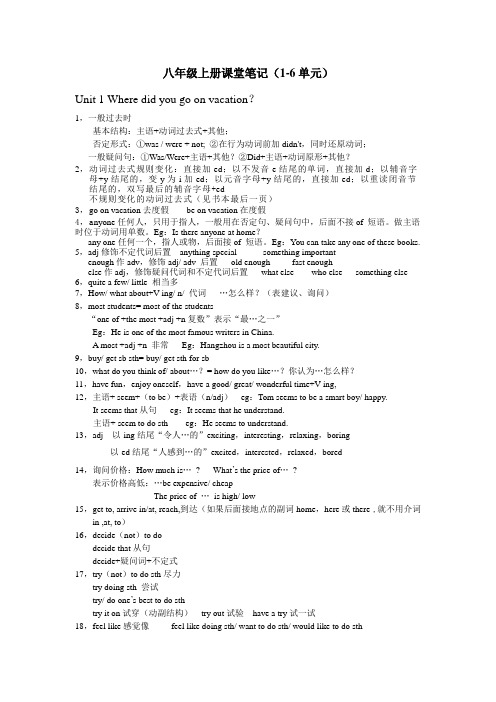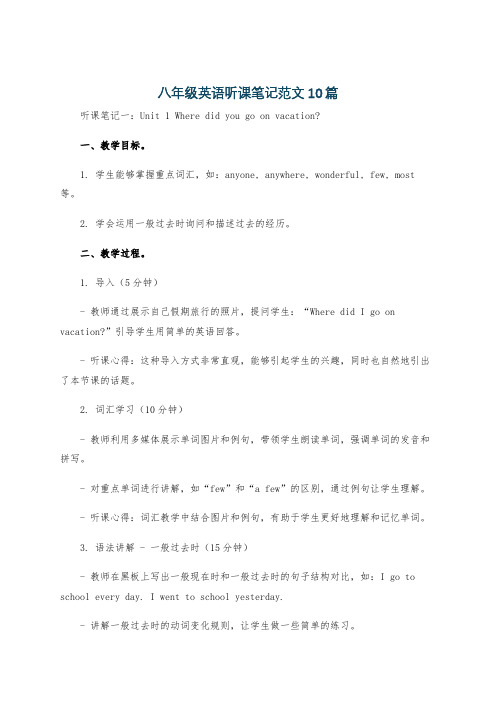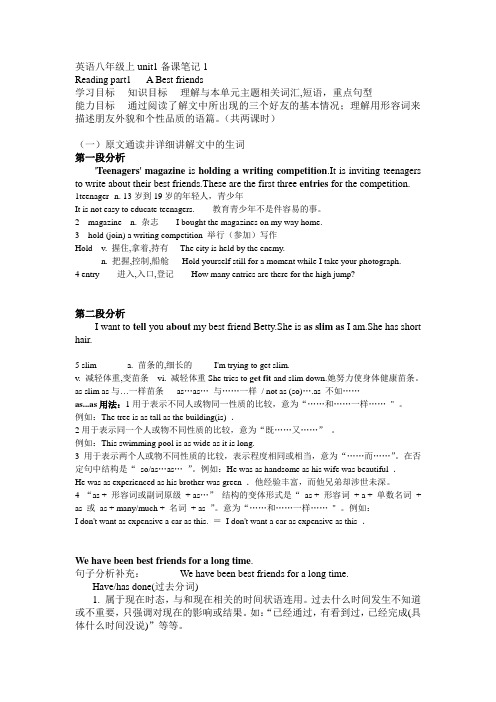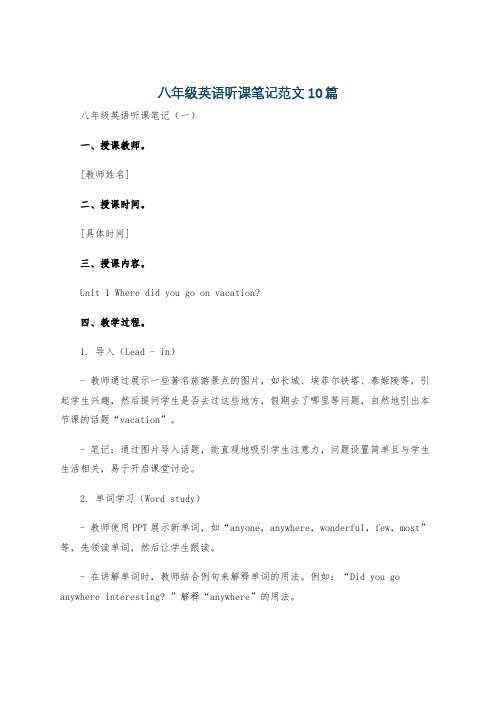八年级上册英语课堂笔记(1-6单元)备课讲稿
人教版八年级英语上册单元笔记_I_(Unit1-Unit6)_本人原创

人教版八年级英语上册知识点总结Unit 1: How often do you exercise?【语言目标】会使用频率副词及短语;能描述课余时间的活动安排;会描述基本饮食结构。
1.How often do you exercise?你多久锻炼一次?本句是对“动作发生的频率”进行的提问,其中“how often”是一个特殊疑问词。
所谓的“频率”指的是某个动作多长时间/多久发生一次。
试比较:How often do you swim ?你多久游一次泳?How often does your father go to a movie?你爸爸多久看一次电影?针对“how often”引导的问句所进行的回答:本单元常用的表示频率的短语有:once a week, twice a week, three times a month等等。
当然,也可以用一些常见的频度副词来进行回答,如always ,usually, often, sometimes, hardly ever, never.例:对划线部分提问:He always takes a bus to school. 注:划线部分都是对“频率”的描述,所以答案为He takes a bus to school twice a week. How often does he take a bus to school?He never takes a bus to school.2.I always go shopping . Go +V-ing 表示“去xx”。
常见形式还有:go swimming,I often go skateboarding. go fishing,go walking...3.I can't stand shopping. 我无法忍受购物。
“can't stand doing sth”意为:无法忍受xxx 。
特别注意:stand 后跟V-ing 形式。
八年级上册英语课堂笔记(1-6单元)

八年级上册课堂笔记(1-6单元)Unit 1 Where did you go on vacation?1,一般过去时基本结构:主语+动词过去式+其他;否定形式:①was / were + not; ②在行为动词前加didn't,同时还原动词;一般疑问句:①Was/Were+主语+其他?②Did+主语+动词原形+其他?2,动词过去式规则变化:直接加ed;以不发音e结尾的单词,直接加d;以辅音字母+y结尾的,变y为i加ed;以元音字母+y结尾的,直接加ed;以重读闭音节结尾的,双写最后的辅音字母+ed不规则变化的动词过去式(见书本最后一页)3,go on vacation去度假be on vacation在度假4,a nyone任何人,只用于指人,一般用在否定句、疑问句中,后面不接of 短语。
做主语时位于动词用单数。
Eg:Is there anyone at home?any one任何一个,指人或物,后面接of 短语。
Eg:You can take any one of these books. 5,adj修饰不定代词后置anything special something importantenough作adv,修饰adj/ adv 后置old enough fast enoughelse作adj,修饰疑问代词和不定代词后置what else who else something else 6,quite a few/ little 相当多7,How/ what about+V-ing/ n/ 代词…怎么样?(表建议、询问)8,most students= most of the students“one of +the most +adj +n复数”表示“最…之一”Eg:He is one of the most famous writers in China.A most +adj +n 非常Eg:Hangzhou is a most beautiful city.9,buy/ get sb sth= buy/ get sth for sb10,what do you think of/ about…?= how do you like…?你认为…怎么样?11,have fun,enjoy oneself,have a good/ great/ wonderful time+V-ing,12,主语+ seem+(to be)+表语(n/adj)eg:Tom seems to be a smart boy/ happy.It seems that从句eg:It seems that he understand.主语+ seem to do sth eg:He seems to understand.13,adj 以-ing结尾“令人…的”exciting,interesting,relaxing,boring以-ed结尾“人感到…的”excited,interested,relaxed,bored14,询问价格:How much is…? What’s the price of…?表示价格高低:…be expensive/ cheapThe price of …is high/ low15,get to, arrive in/at, reach,到达(如果后面接地点的副词home,here或there,就不用介词in ,at, to)16,decide(not)to dodecide that从句decide+疑问词+不定式17,try(not)to do sth尽力try doing sth 尝试try/ do one’s best to do sthtry it on试穿(动副结构)try out试验have a try试一试18,feel like感觉像feel like doing sth/ want to do sth/ would like to do sth19,a lot of= lots of =plenty of20,in the past在过去21,enjoy/ like doing22,感叹句:How+adj+主谓!How+adj+a/an +n单+主谓!What+ a/an +adj+ n单+主谓!What+ adj+ n复/ 不可数+主谓!23,more than=over超过less than 少于more or less或多或少24,wait for等待25,too many“太多”修饰可数名词复数too much“太多”修饰不可数名词much too“实在太”修饰形容词或副词26,because+从句because of +n/ V-ing /代词27,enough作adj修饰n,enough time enough moneyhave enough…to do sth eg:I have enough time to finish the work.enough作adv修饰adj/ adv old enough fast enough…enough for sb to do sth eg:The job is easy enough for me to do.not…enough to do The book isn’t easy enough for me to read.too…to…The book is too difficult for me to read.so…that…The book is so difficult that I can’t read.28,the next day第二天29,remember/ forget+to do要做+doing做过30,Stop sb from doing sth阻止Stop to do 停下来去做其他事Stop doing 停止正在做的事31,another two hours=two more hours32,at the top of在…顶端,名列…之前强调点on the top of在…上面强调面33,find out查明,弄清find找到(结果)look for寻找(过程)34,go on with/ doing sth继续原来的事go on to do sth继续做别的事35,so +adj +that +结果状语从句“如此……以致……”eg:I was so busy that I didn’t go to sleep for 3 days.so that 引导目的状语从句,以便,为了(in order to)eg:they got up early so that they could catch the early bus.so +adj +(a/ an+n单数)that It is so important a meeting that I can’t miss it.such+ a/ an+ adj + n单数+that It is such an important meeting that I can’t miss it.such+ adj+n复数/不可数+thatUnit 2 How often do you exercise?1,How如何(方式)how long多长(时间)答语常用“(For/ about +)时间段”how far多远(距离)答语常用“(It’s +)数词 +miles/ meters/ kilometers”how often多久一次(频率)答语常用“Always/ often/ every day/…”或“次数+时间”等表频率的状语How soon多快,多久以后,常用在将来时中。
八年级上册英语译林版知识点笔记

八年级上册英语译林版知识点笔记Unit 1:Talking about past events:- We use the past simple to talk about actions or situations that happened at a specific time in the past.- Regular verbs end in -ed in the past simple, while irregular verbs have their own unique past simple forms.Unit 2:Talking about future plans and arrangements:- We use "be going to" to talk about our future plans and intentions.- We use the present continuous to talk about future arrangements and fixed plans.Unit 3:Talking about abilities:- We use "can" to talk about general abilities and"can't" to talk about things we are not able to do.Unit 4:Asking for and giving advice:- We use "should" to give advice or make recommendations.- We use "ought to" to give strong advice.Unit 5:Expressing preferences:- We use "prefer" to talk about what we like more than something else.- We can use "would rather" to express a preference in a polite way.Unit 6:Making and responding to suggestions:- We can use "Let's" to make suggestions for things we can do together.- We can respond to suggestions with "That's a greatidea!" or "I'd love to!"Unit 7:Describing habits and routines:- We use the present simple to talk about things that are generally true or that happen regularly.- We use adverbs of frequency, such as "always," "often," "usually," "sometimes," and "never," to describe how often an action takes place.Unit 8:Talking about future possibilities:- We use "might" and "may" to talk about things that are possible in the future.- We use "could" to talk about past abilities or future possibilities.。
八年级英语听课笔记范文10篇

八年级英语听课笔记范文10篇听课笔记一:Unit 1 Where did you go on vacation?一、教学目标。
1. 学生能够掌握重点词汇,如:anyone, anywhere, wonderful, few, most 等。
2. 学会运用一般过去时询问和描述过去的经历。
二、教学过程。
1. 导入(5分钟)- 教师通过展示自己假期旅行的照片,提问学生:“Where did I go on vacation?”引导学生用简单的英语回答。
- 听课心得:这种导入方式非常直观,能够引起学生的兴趣,同时也自然地引出了本节课的话题。
2. 词汇学习(10分钟)- 教师利用多媒体展示单词图片和例句,带领学生朗读单词,强调单词的发音和拼写。
- 对重点单词进行讲解,如“few”和“a few”的区别,通过例句让学生理解。
- 听课心得:词汇教学中结合图片和例句,有助于学生更好地理解和记忆单词。
3. 语法讲解 - 一般过去时(15分钟)- 教师在黑板上写出一般现在时和一般过去时的句子结构对比,如:I go to school every day. I went to school yesterday.- 讲解一般过去时的动词变化规则,让学生做一些简单的练习。
- 听课心得:语法讲解清晰明了,对比的方式让学生更容易掌握两种时态的区别。
4. 对话练习(15分钟)- 教师给出对话模板,让学生两人一组进行对话练习,内容是关于假期去了哪里,做了什么。
- 巡视课堂,对学生的对话进行指导和纠正。
- 请几组学生上台展示对话。
- 听课心得:对话练习能够提高学生的口语表达能力,上台展示也增加了学生的自信心。
5. 课堂小结与作业布置(5分钟)- 教师总结本节课的重点内容,包括词汇和语法。
- 布置作业:写一篇关于自己假期经历的短文,运用一般过去时。
- 听课心得:课堂小结有助于学生巩固知识,作业布置合理,能够让学生进一步巩固所学内容。
英语八年级上unit1备课笔记1

英语八年级上unit1备课笔记1Reading part1 A Best friends学习目标知识目标理解与本单元主题相关词汇,短语,重点句型能力目标通过阅读了解文中所出现的三个好友的基本情况;理解用形容词来描述朋友外貌和个性品质的语篇。
(共两课时)(一)原文通读并详细讲解文中的生词第一段分析'Teenagers' magazine is holding a writing competition.It is inviting teenagers to write about their best friends.These are the first three entries for the competition.1teenager n. 13岁到19岁的年轻人,青少年It is not easy to educate teenagers. 教育青少年不是件容易的事。
2 magazine n. 杂志I bought the magazines on my way home.3 hold (join) a writing competition 举行(参加)写作Hold v. 握住,拿着,持有The city is held by the enemy.n. 把握,控制,船舱Hold yourself still for a moment while I take your photograph.4 entry 进入,入口,登记How many entries are there for the high jump?第二段分析I want to tell you about my best friend Betty.She is as slim as I am.She has short hair.5 slim a. 苗条的,细长的I'm trying to get slim.v. 减轻体重,变苗条vi. 减轻体重She tries to get fit and slim down.她努力使身体健康苗条。
八年级英语听课笔记范文10篇

八年级英语听课笔记范文10篇八年级英语听课笔记(一)一、授课教师。
[教师姓名]二、授课时间。
[具体时间]三、授课内容。
Unit 1 Where did you go on vacation?四、教学过程。
1. 导入(Lead - in)- 教师通过展示一些著名旅游景点的图片,如长城、埃菲尔铁塔、泰姬陵等,引起学生兴趣,然后提问学生是否去过这些地方,假期去了哪里等问题,自然地引出本节课的话题“vacation”。
- 笔记:通过图片导入话题,能直观地吸引学生注意力,问题设置简单且与学生生活相关,易于开启课堂讨论。
2. 单词学习(Word study)- 教师使用PPT展示新单词,如“anyone,anywhere,wonderful,few,most”等,先领读单词,然后让学生跟读。
- 在讲解单词时,教师结合例句来解释单词的用法。
例如:“Did you go anywhere interesting? ”解释“anywhere”的用法。
- 笔记:单词教学采用先领读再讲解例句的方式,有助于学生掌握单词的读音和用法。
结合例句记忆单词效果更好。
3. 语法讲解(Grammar)- 重点讲解一般过去时的特殊疑问句。
教师在黑板上写出例句:“Where did you go on vacation?”“What did you do?”等。
- 分析句子结构,强调助动词“did”的用法,以及动词在一般过去时中的变化形式。
- 笔记:语法讲解清晰,在黑板上写例句方便学生观察句子结构,有助于理解一般过去时特殊疑问句的构成。
4. 听力练习(Listening practice)- 播放听力材料,听力内容是关于不同人假期的经历。
- 在播放听力之前,教师给出一些听力问题,如“Where did Tom go?”“What did he do there?”等,让学生带着问题听听力。
- 听力结束后,教师与学生一起核对答案,并对听力中的重点内容进行再次强调。
八年级上册英语笔记1~10单元
八年级上册英语笔记(1 - 10 单元)一、Unit 1 Where did you go on vacation?(一)重点词汇1.anyone /ˈeniwʌn/ 任何人-解析:用于疑问句和否定句中,表示“任何人”。
-例句:Did anyone see my keys?(有人看到我的钥匙了吗?)2.wonderful /ˈwʌndəfl/ 精彩的;极好的-解析:形容事物非常好,令人愉悦。
-例句:We had a wonderful time on vacation.(我们在假期里过得非常愉快。
)3.few /fjuː/ 很少;几乎没有-解析:修饰可数名词,表示数量少。
-例句:There are few people in the park today.(今天公园里人很少。
)4.quite a few 相当多;不少-解析:强调数量比较多。
-例句:I took quite a few photos on my trip.(我在旅行中拍了不少照片。
)5.most /məʊst/ 大多数;大部分-解析:可作形容词、名词或副词。
-例句:Most people like to travel.(大多数人喜欢旅行。
)(二)重点句型1.Where did you go on vacation? 你去哪里度假了?-解析:这是一个特殊疑问句,询问过去的动作。
-例句:Where did you go last weekend?(你上周末去哪里了?)2.Did you go anywhere interesting? 你去了什么有趣的地方吗?-解析:一般疑问句,用“Did + 主语+ 动词原形”的结构。
-例句:Did you do anything special yesterday?(你昨天做了什么特别的事情吗?)3.I went to the mountains. 我去了山区。
-解析:简单的陈述句,表达过去的动作。
八年级上册英语课堂笔记
八年级上册课堂笔记(1-6单元)Unit 1 Where did you go on vacation1,一般过去时基本结构:主语+动词过去式+其他;否定形式:①was / were + not; ②在行为动词前加didn't,同时还原动词;一般疑问句:①Was/Were+主语+其他②Did+主语+动词原形+其他2,动词过去式规则变化:直接加ed;以不发音e结尾的单词,直接加d;以辅音字母+y结尾的,变y为i加ed;以元音字母+y结尾的,直接加ed;以重读闭音节结尾的,双写最后的辅音字母+ed不规则变化的动词过去式(见书本最后一页)3,go on vacation去度假 be on vacation在度假4,anyone任何人,只用于指人,一般用在否定句、疑问句中,后面不接of 短语。
做主语时位于动词用单数。
Eg:Is there anyone at homeany one任何一个,指人或物,后面接of 短语。
Eg:You can take any one of these books. 5,adj修饰不定代词后置 anything special something importantenough作adv,修饰adj/ adv 后置 old enough fast enoughelse作adj,修饰疑问代词和不定代词后置 what else who else something else 6,quite a few/ little 相当多7,How/ what about+V-ing/ n/ 代词…怎么样(表建议、询问)8,most students= most of the students“one of +the most +adj +n复数”表示“最…之一”Eg:He is one of the most famous writers in China.A most +adj +n 非常 Eg:Hangzhou is a most beautiful city.9,buy/ get sb sth= buy/ get sth for sb10,what do you think of/ about…= how do you like…你认为…怎么样11,have fun,enjoy oneself,have a good/ great/ wonderful time+V-ing,12,主语+ seem+(to be)+表语(n/adj) eg:Tom seems to be a smart boy/ happy.It seems that从句 eg:It seems that he understand.主语+ seem to do sth eg:He seems to understand.13,adj 以-ing结尾“令人…的”exciting,interesting,relaxing,boring 以-ed结尾“人感到…的”excited,interested,relaxed,bored14,询问价格:How much is… What’s the price of…表示价格高低:…be expensive/ cheapThe price of … is high/ low15,get to, arrive in/at, reach,到达(如果后面接地点的副词home,here或there ,就不用介词in ,at, to)16,decide(not)to dodecide that从句decide+疑问词+不定式17,try(not)to do sth尽力try doing sth 尝试try/ do one’s best to do sthtry it on试穿(动副结构) try out试验 have a try试一试18,feel like感觉像 feel like doing sth/ want to do sth/ would like to do sth19,a lot of= lots of =plenty of20,in the past在过去21,enjoy/ like doing22,感叹句:How+adj+主谓!How+adj+a/an +n单+主谓!What+ a/an +adj+ n单+主谓!What+ adj+ n复/ 不可数+主谓!23,more than=over超过 less than 少于 more or less或多或少24,wait for等待25,too many“太多”修饰可数名词复数too much“太多”修饰不可数名词much too“实在太”修饰形容词或副词26,because+从句 because of +n/ V-ing /代词27,enough作adj修饰n, enough time enough moneyhave enough…to do sth eg:I have enough time to finish the work. enough作adv修饰adj/ adv old enough fast enough…enough for sb to do sth eg:The job is easy enough for me to do. not…enough to do The book isn’t easy enough for me to read.too…to… The book is too difficult for me to read.so…that… The book is so difficult that I can’t read.28,the next day第二天29,remember/ forget+to do要做+doing做过30,Stop sb from doing sth阻止Stop to do 停下来去做其他事Stop doing 停止正在做的事31,another two hours=two more hours32,at the top of在…顶端,名列…之前强调点on the top of在…上面强调面33,find out查明,弄清 find找到(结果) look for寻找(过程)34,go on with/ doing sth继续原来的事go on to do sth继续做别的事35,so +adj +that +结果状语从句“如此……以致……”eg:I was so busy that I didn’t go to sleep for 3 days.so that 引导目的状语从句,以便,为了(in order to)eg:they got up early so that they could catch the early bus.so +adj +(a/ an+n单数)that It is so important a meeting that I can’t miss it.such+ a/ an+ adj + n单数+that It is such an important meeting that I can’t miss it.such+ adj+n复数/不可数+thatUnit 2 How often do you exercise1,How 如何(方式)how long 多长(时间)答语常用“(For/ about +)时间段”how far多远(距离)答语常用“(It’s +)数词 +miles/ meters/ kilometers”how often多久一次(频率)答语常用“Always/ often/ every day/…”或“次数+时间”等表频率的状语How soon多快,多久以后,常用在将来时中。
人教版英语八年级上册unit1笔记
八年级上册Unit1课堂笔记一、单词1、hardly []adv.几乎不;几乎没有hard(坚硬的,困难的)+-ly(副词后缀)Eg:Hardly anybody came.几乎没有人来。
2、twice []a dv.两次;两倍1)twice表示“两次”时,不和time连用。
2)在表示“一两次”时,要用or连接。
即:once or twiceEg:He goes to the cinema twice a month(对画线部分提问)How often does he go to the cinema?3、once []adv.一次Eg:I go to see a film once a week.我每周看一场电影。
常见的短语有at once 立刻;once again再一次。
▲表示一次、两次用once、twice。
表示三次或者三次以上用:数字+times (three times)4、health []n.健康;健康状况1)同根词:healthy adj.健康的;healthily adv.健康地2)相关的短语:be in good/poor health身体好(不好)Eg :You must learn to eat healthily and take exercise regularly.5、difference []n.不同;区别;差异1)它的形容词为different;2) difference 是可数名词。
Eg:Is her lifestyle the same as yours or ? What are the ?A.difference;differentB.different;differenceC.different;differences6、unhealthy []adj.不健康的;不益于健康的un-(否定前缀)+healthy(健康的)1)反义词healthy2)常作定语,如:I have an unhealthy habit.3)注意加前缀un变否定形式的词。
八年级英语上册笔记(全部)
Unit1 Playing SportsTopic1 I’m going to play basketball.【重点短语】1. during the summer holidays 1.在暑假期间2. between…and… 2.在两者之间3. cheer sb. on 3.为某人加油4. prefer doing sth. 4.更喜欢做某事5. quite a bit/a lot 5.很多6. plan to do sth. 6.计划做某事7. have a skating club 7.举办滑雪俱乐部8. go skating/skiing/bicycling/climbing/hiking 8.去滑雪/滑冰/骑车/爬山/远足9. arrive in/at 9.到达10. play against…10.与……对抗/较量11. for long 11.很久12. leave for…12.动身去…13. the day after tomorrow 13.后天14. China’s national team14.中国国家队15. play baseball 15.打棒球16. at least 16.至少17. What a shame! 17. 多羞愧!18. be good at 18.善于做某事19. take part in 19.参加20. all over the world 20.全世界21. be good for 21.对……有益22. a good way 22.一种好方法23. keep fit/healthy 23.保持健康24. relax oneself 24.放松某人自己【重点句型】1. What’s your favorite sport? = What sport do you like best? 你最喜爱的运动是什么?2. Which sport do you prefer? = Which sport do you like better?你更喜欢什么运动?I prefer skating. = I like skating better. 我更喜欢滑雪.3. Do you skate much? = Do you often skate? 你常滑雪吗?4. She spends at least half an hour in the gym every day. 每天她至少花半小时在体育馆.5. She plays baseball pretty well and she is also good at jumping. 她棒球打得相当好而且擅长于跳.6. What kind of sports do you like? = Which sport do you like? 你喜欢哪种运动?7. Would you like to come and cheer us on? 你愿意来为我们加油吗?8. What are you going to be when you grow up? 当你长大后做什么?9. There is going to be a school sports meet next month.下月有一场运动会。
- 1、下载文档前请自行甄别文档内容的完整性,平台不提供额外的编辑、内容补充、找答案等附加服务。
- 2、"仅部分预览"的文档,不可在线预览部分如存在完整性等问题,可反馈申请退款(可完整预览的文档不适用该条件!)。
- 3、如文档侵犯您的权益,请联系客服反馈,我们会尽快为您处理(人工客服工作时间:9:00-18:30)。
八年级上册英语课堂笔记(1-6单元)八年级上册课堂笔记(1-6单元)Unit 1 Where did you go on vacation?1,一般过去时基本结构:主语+动词过去式+其他;否定形式:①was / were + not; ②在行为动词前加didn't,同时还原动词;一般疑问句:①Was/Were+主语+其他?②Did+主语+动词原形+其他?2,动词过去式规则变化:直接加ed;以不发音e结尾的单词,直接加d;以辅音字母+y结尾的,变y为i加ed;以元音字母+y结尾的,直接加ed;以重读闭音节结尾的,双写最后的辅音字母+ed不规则变化的动词过去式(见书本最后一页)3,go on vacation去度假 be on vacation在度假4,a nyone任何人,只用于指人,一般用在否定句、疑问句中,后面不接of 短语。
做主语时位于动词用单数。
Eg:Is there anyone at home?any one任何一个,指人或物,后面接of 短语。
Eg:You can take any one of these books.5,adj修饰不定代词后置 anything special something importantenough作adv,修饰adj/ adv 后置 old enough fast enoughelse作adj,修饰疑问代词和不定代词后置 what else who else something else6,quite a few/ little 相当多7,How/ what about+V-ing/ n/ 代词…怎么样?(表建议、询问)8,most students= most of the students“one of +the most +adj +n复数”表示“最…之一”Eg:He is one of the most famous writers in China.A most +adj +n 非常 Eg:Hangzhou is a most beautiful city.9,buy/ get sb sth= buy/ get sth for sb10,what do you think of/ about…?= how do you like…?你认为…怎么样?11,have fun,enjoy oneself,have a good/ great/ wonderful time+V-ing,12,主语+ seem+(to be)+表语(n/adj) eg:Tom seems to be a smart boy/ happy.It seems that从句 eg:It seems that he understand.主语+ seem to do sth eg:He seems to understand.13,adj 以-ing结尾“令人…的”exciting,interesting,relaxing,boring 以-ed结尾“人感到…的”excited,interested,relaxed,bored14,询问价格:How much is… ? What’s the price of… ?表示价格高低:…be expensive/ cheapThe price of … is high/ low15,get to, arrive in/at, reach,到达(如果后面接地点的副词home,here或there ,就不用介词in ,at, to)16,decide(not)to dodecide that从句decide+疑问词+不定式17,try(not)to do sth尽力try doing sth 尝试try/ do one’s best to do sthtry it on试穿(动副结构) try out试验 have a try试一试18,feel like感觉像 feel like doing sth/ want to do sth/ would like to do sth19,a lot of= lots of =plenty of20,in the past在过去21,enjoy/ like doing22,感叹句:How+adj+主谓!How+adj+a/an +n单+主谓!What+ a/an +adj+ n单+主谓!What+ adj+ n复/ 不可数+主谓!23,more than=over超过 less than 少于 more or less或多或少24,wait for等待25,too many“太多”修饰可数名词复数too much“太多”修饰不可数名词much too“实在太”修饰形容词或副词26,because+从句 because of +n/ V-ing /代词27,enough作adj修饰n, enough time enough moneyhave enough…to do sth eg:I have enough time to finish the work. enough作adv修饰adj/ adv old enough fast enough…enough for sb to do sth eg:The job is easy enough for me to do. not…enough to do The book isn’t easy enough for me to read.too…to… The book is too difficult for me to read.so…that… The book is so difficult that I can’t read.28,the next day第二天29,remember/ forget+to do要做+doing做过30,Stop sb from doing sth阻止Stop to do 停下来去做其他事Stop doing 停止正在做的事31,another two hours=two more hours32,at the top of在…顶端,名列…之前强调点on the top of在…上面强调面33,find out查明,弄清 find找到(结果) look for寻找(过程)34,go on with/ doing sth继续原来的事go on to do sth继续做别的事35,so +adj +that +结果状语从句“如此……以致……”eg:I was so busy that I didn’t go to sleep for 3 days.so that 引导目的状语从句,以便,为了(in order to)eg:they got up early so that they could catch the early bus.so +adj +(a/ an+n单数)that It is so important a meeting that I can’t miss it.such+ a/ an+ adj + n单数+that It is such an important meeting that I can’t miss it.such+ adj+n复数/不可数+thatUnit 2 How often do you exercise?1,How如何(方式)how long多长(时间)答语常用“(For/ about +)时间段”how far多远(距离)答语常用“(It’s +)数词 +miles/ meters/ kilometers”how often多久一次(频率)答语常用“Alwa ys/ often/ every day/…”或“次数+时间”等表频率的状语How soon多快,多久以后,常用在将来时中。
答语常用“in +时间段”how many多少(接可数名词) how much(接不可数名词)2,exercise作v 锻炼,运动作[c] 操,练习 do morning/ eye exercises作[uc] 锻炼 take much/ more exercise3,at+钟点 at 7 o’clock at noon/ at night(during/ in the day) at this/ that time at the age ofon+ 具体某天、星期、特指的一天、纪念日、节日on April 1st on Sunday on a cold winter morning on Teachers’ Dayin +上午、下午、晚上、年、月、季节、年代、世纪 in the morning/afternoon/ evening in 1999 in August in autumn in 1960s in the 21st century 4,help sb (to)do sthhelp sb with sthwith sb’s help= with the help of sb5,do(the)housework= do chores6,频度副词(行前be 后)Always usually often sometimes seldom hardly never7,sometimes 有时(频度副词) sometime(将来)有朝一日,(曾经)某天Some times 几次,几倍 some time 一段时间(前面用介词for)8,go shopping= do some shopping9,once twice three times10,at once,right now,right away, in a minute,in a moment,in no time 立刻,马上once more再一次,重新 once upon a time 从前,曾经11,every day 每天 everyday日常的,每天的12,on the internet13,what’s your favorite program?=what program do you like best?14,free 空闲的 in one’s free time be free自由的 as free as a fish freedom n.自由免费的 The best things in life are free.15,be full =be busy忙的 be busy doing sth/ be busy with sthbe full of充满 eg:The bottle is full of milk.16,How come?怎么会?为什么?17,may be 为情态动词+动词原形,在句子中做谓语,maybe是副词,表示可能,大概,一般放在句首(perhaps)。
